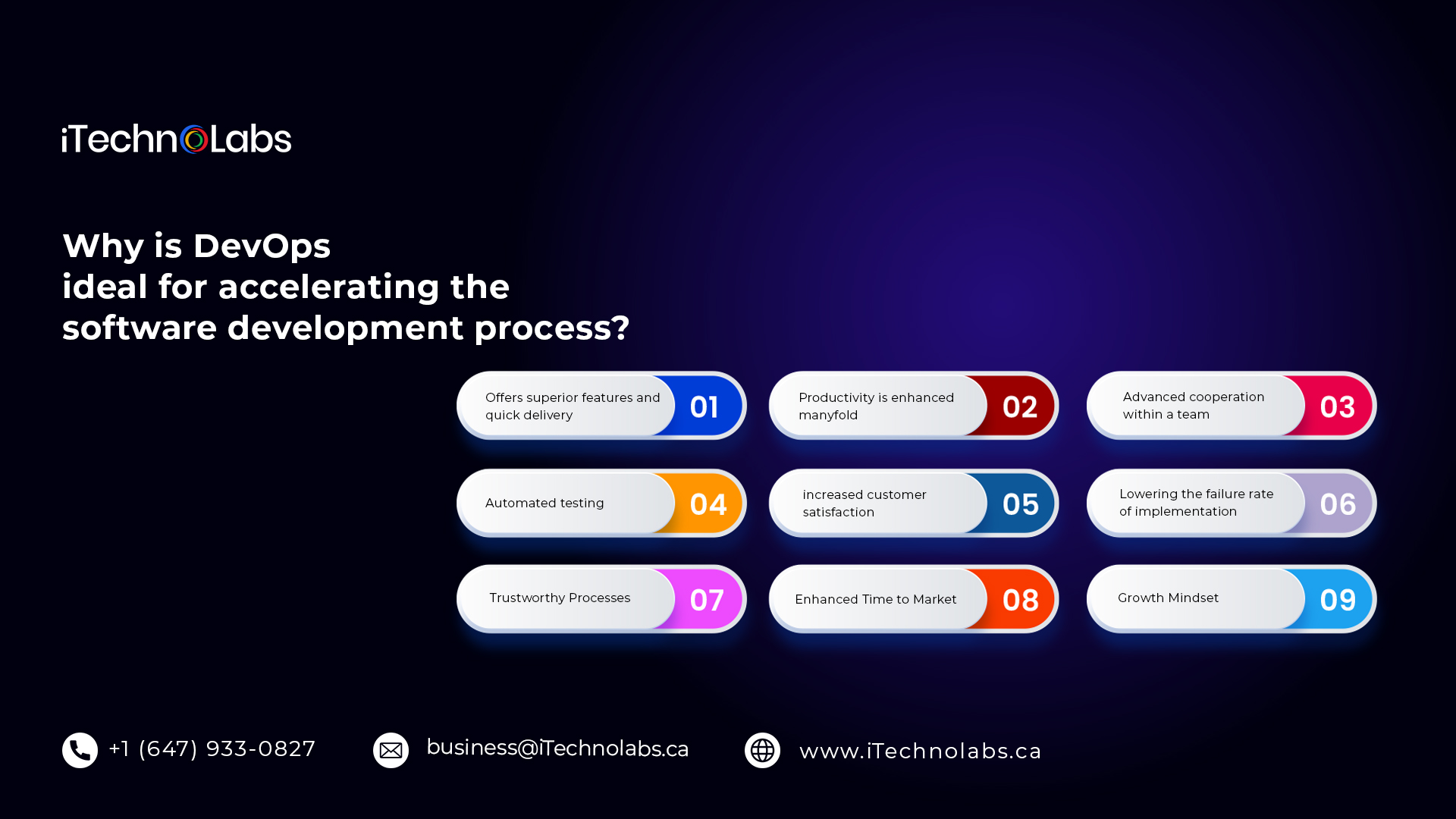Last updated on May 24th, 2023
By unifying the activities of the business’s developing, operations, and quality control workgroups, DevOps, a conjunction term for “development and operations,” is a crucial set of methods and tools that are intended to boost a company’s effectiveness and consistency.
Due to the rising demand for SaaS and cloud services, various cloud providers are also offering DevOps approaches as management services with some enhanced features and assistance. Professionals with expertise in implementing the DevOps Methodology for the Software Development Process are finally getting their respect in data science.
Why is DevOps ideal for accelerating the software development process?
Teams that embrace the DevOps ethos, methods, and solutions develop into high-performing organizations that produce better-quality products and make for happier customers. Increasing productivity and teamwork are essential for accomplishing company objectives. Let’s look at the top 9 ways DevOps has enhanced the software development process.
1. Offers superior features and quick delivery
Once the IT teams have given their approval, the developers only carry out the project rollout. After the development has been completed, the IT department is contacted to verify product features, the evaluation procedure, and other factors. The team may expand the interface and be configured much more effectively. This endeavour could be stressful and last longer than anticipated.
The advent of DevOps brought about a completely new methodology and provided automation at every level. Because once the DevOps mechanism is set up, the team receives the right input at each stage, allowing them to make the required modifications and tweaks simultaneously.
2. Productivity is enhanced manyfold
Integration and automation testing are used to undertake a planned amount of repetitive, laborious work. It allows developers to receive the settings for product design and code synchronization.
The aforementioned two actions are carried out with the minimal effort of pressing a button. DevOps device makes it easier for developers to do their jobs, allowing the product project phase to be fully handled tactically and effectively. The task is then done more quickly and effectively, leading to better outcomes, including removing process issues and producing more useful work.
3. Advanced cooperation within a team
The improved team communication that comes with the DevOps Software Development process keeps their business growing. Working independently by the creation and deployment teams was one of the causes of the lack of output.
DevOps has enabled groups to cooperate and work in unison for several objectives. It enables the teamwork culture that eventually helps increase efficiencies by allowing each team to operate effectively. Productivity is improved, but you might also minimize downtime, money, and execution times as the process becomes more smooth.
4. Automated testing
With dependable IT services, DevOps assists developers in starting the product release process. Through laborious efforts, it enables engineers to begin the automated testing process. It removes roadblocks and issues from the complete automated testing procedure.
DevOps propelled design and development to be up and running and finished with targeted results. Automated testing for DevOps allows for quicker responses. The code update is automatically integrated. The result of the project management is then released and fully realized. Additionally, it can receive minor upgrades, which are utilized to speed up the Software Development Process.
5. Increased customer satisfaction
Through the more reactive development of usable applications, DevOps increases consumer engagement. All apps are promptly produced through a joint effort, taking the quality and best for customer demands and desires. The end-users are efficiently provided for, and the DevOps-embedded cultural base continuously improves to optimize the customer experience.
6. Lowering the failure rate of implementation
Because the development period is quicker with DevOps, frequent code revisions are encouraged. This leads to the simple and speedy detection of code flaws. Teams can employ agile coding techniques to reduce the number of unsuccessful implementations. When software developers and activities collaborate to engage in discussion and evolve together, recovering from any loss caused by minute errors is greatly simplified, thus speeding up Software Development Process.
7. Trustworthy Processes
DevOps gives developers access to a variety of ideas and tools that can assist them in ensuring a dependable workflow and targeted testing. This kind of automated method makes it possible to produce applications of a higher grade. It encourages the group to analyze and release more quickly. The development of the product is then aided by the DevOps Software Development process, which the administration drives, continuous delivery, configuration testing, targeted planning, and development version control.
Most of the time, Devops uses this dependable, productive, and planned automation technique to prevent failure and its consequences. Additionally, it assists developers in avoiding tasks brought on by manual procedures and laborious tasks. Then, using positive impact on the development, manufacturing, and deployment helps developers make the proper products.
8. Enhanced Time to Market
DevOps is an effective way to reach the desired demographic quickly. It is comparable to the Disciplined agile delivery method, where appropriate programming, thorough testing, and operations are all used during the Software development process. The DevOps ecosystem is excellent for evaluating and creating products across various operational phases.
The IT team members use DevOps to ensure efficient operations and production. The manufacturing lifecycle can be used to deploy all modifications thanks to DevOps. It ensures the proper production atmosphere is selected before the coding cycle begins. Additionally, it eliminates the problems caused by misunderstandings and poor communication that arise when two different IT management teams collaborate.
9. Growth Mindset
A growth mindset can take you and your business far.DevOps teams that operate well cultivate a dynamic attitude. They learn from their mistakes quickly and implement them into their procedures, which leads to continuous improvement, higher levels of customer experience, and quicker creativity and market responsiveness. There is always an opportunity for improvement because the Software Development process is a journey.
Important Article: How to Hire an Agile Software Development Team From iTechnolabs
The application lifestyle and Devops- A study

Phase 1: Planning
DevOps teams develop, specify, and define the functionalities and features of the systems and applications they are creating throughout the planning phase. They monitor progress at low and high degrees of detail, from activities that encompass portfolios of numerous items to activities that cover only one commodity. Software developers plan with speed and transparency by employing backlogs, and bug fixing, to govern agile software development and dashboards to visualize performance.
Phase 2: Development
This phase entails authoring, debugging, reviewing, and integrating group members’ individual and collective code and creating build artifacts that may be distributed into multiple environments. Development teams aim to innovate quickly without compromising reliability, consistency, or efficiency. They accomplish this by utilizing highly effective tools, automating tedious manual tasks, and iterating incrementally via test automation and continuous deployment.
Phase 3: Deliver
Delivery is the practice of consistent and dependable application deployment into production settings. The core architecture that compensates those environments, which is completely regulated, must also be deployed and configured during the delivery period.
Teams create release management featuring distinct manual review steps during the delivery phase. Additionally, they install automatic gates that advance applications through several phases until clients may access them. These operations can be scaled, repeated, and controlled by automation. Teams that use DevOps can regularly deliver with ease, assurance, and a sense of security.
Phase 4: Operate
In the operational phase, programs in production systems are maintained, watched over, and troubleshot. Teams that implement DevOps principles endeavour to strengthen security and accountability while ensuring platform dependability, uptime, and a goal of zero downtime. When problems arise, DevOps teams work rapidly to detect them, resolve them, and prevent any negative effects on the user experience. Rich monitoring, timely alerts, and complete visibility into apps and latent problem systems are all essential for sustaining this attentiveness for a successful Software Development Process.
Related Article: Offshore Software Development Process – Benefits, Challenges, Costs and More
Do You Want to Know Our DevOps Methodology for Your Software Development Process?
Numerous techniques exist for DevOps to speed up the Software development process. And since there are plenty of choices, it brings ease to the entire process. No one business is restricted to just one technique. They can experiment and find out which ones work best for their business. Each company has a unique approach to quickening product development.












